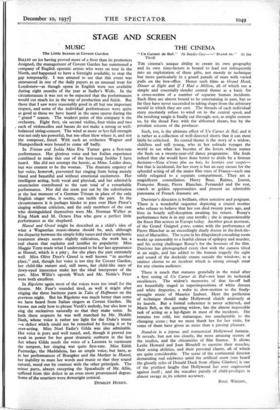THE CINEMA
"tin Carnet de Bal." At Studio One--" Stand-in." At the Tivoli
THE cinema's unique ability to create its own geography and its own time-factors is bound to lead not infrequently into an exploitation of these gifts, not merely in technique but more particularly in a grand parade of stars with varied pulls on the box-office. Hence such films as Grand Hotel, Dinner at Eight and If I Had a Million, all of which use a simple and essentially slender central theme as a basis for a cross-section of a number of separate human incidents. Such films are almost bound to be entertaining in part, but so far they have never succeeded in taking shape from the arbitrary mould in which they are cast. The threads of each individual story resolutely refuse to wind on to the central spool, and the resulting tangle is finally cut through, not, as might content us, by the dread Fate with the abhorred shears, but by the petulant scissors of the producer.
Such, too, is the ultimate effect of Un Carnet de Bal, and it is rather as a collection of well-directed shorts that it can most fairly be criticised. Its central theme is the story of a widow, childless and still young, who in her solitude voyages the world to see what has become of the lovers whose names she finds on a twenty-year-old dance programme. She finds indeed that she would have done better to abide by a famous decision—Nous n'irons plus au bois, les lauriers sont coupds- but that is incidental, for her story is but an easy excuse for the splendid acting of all the major film stars of France—each one safely relegated to a separate compartment. They are a magnificent constellation. Harry Baur, Raimu, jouvet, Francoise Rosay, Pierre Blanchar, Fernandel and the rest, snatch at golden opportunities and present an admirable panorama of French dramatic art.
Duvivier's direction is brilliant, often sensitive and poignant. There is a wonderful sequence depicting a crazed mother who refuses to believe that her son died twenty years ago, and lives in hourly self-deception awaiting his return. Rosay's performance here is in any case terrific ; she is unquestionably the finest film actress in Europe today. Another great moment, of the Grand Guignol genre, comes with the performance of Pierre Blanchar as an exceedingly shady doctor in the dock dis- trict of Marseilles. The scene in his dilapidated consulting room works up inexorably to a fearful climax of epilepsy and murder, and his acting challenges Rosay's for the honours of the film. Duvivier has photographed every shot with the camera tilted at an angle, and has added to the human tragedy the sight and sound of the dockside cranes outside the windows, as a sinister chorus to an incident which is strong enough meat for any cinema audience.
There is much that matures gratefully in the mind after a first seeing of U71 Carnet de Ba/—not least its technical excellences. The widow's memories of that far-off ball are beautifully staged in superimpositions of white dresses and white draperies, a waltz in slow-motion to the finely wrought music of Maurice jaubert. Here the perfection of technique should make Hollywood clutch anxiously at its laurels. But a formal coherence is never achieved, and Marie Bell, as the questing widow, has the almost impossible task of acting as a lay-figure in most of the incidents. She remains too cold, too statuesque, too unadaptable to the changing scene ; but we must thank her for her visits, for some of them have given us more than a passing pleasure.
Stand-in is a joyous and nonsensical Hollywood fantasia. It reveals, but not too closely, the more amusing secrets of the studios, and the chicaneries of film finance. It allows Leslie Howard and Joan Blondell to exercise their muscles, their acting abilities, and their personal charm, all of which are quite considerable. The scene of the continental director demanding real edelweiss amid the artificial snow (one heard the ghostly echo of Donald Duck from Alpine Climbers) is one of the prettiest laughs that Hollywood has ever engineered against itself ; and the macabre parody of child-prodigies is almost savage in its solemn accuracy.
BASIL WRIGHT.,






















































 Previous page
Previous page